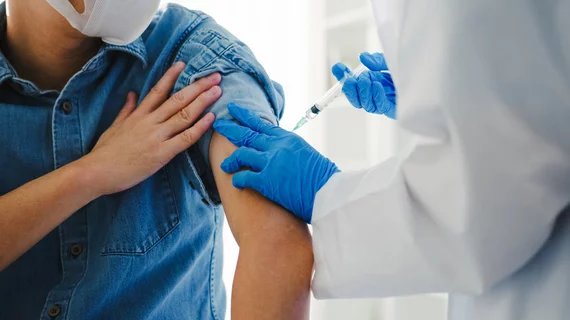‘Highly effective’: COVID-19 vaccines reduced risk of heart failure, other cardiovascular complications after infection
Adults who received COVID-19 vaccinations during the pandemic faced a significantly lower risk of developing post-COVID complications such as heart failure and venous thromboembolism, according to new research published in Heart.[1]
“COVID-19 vaccines have demonstrated high efficacy and effectiveness in preventing infection and reducing the severity of acute-phase infection,” wrote first author Núria Mercadé Besora, PhD, a researcher with the University of Oxford, and colleagues. “However, with the emergence of newer variants of the virus, such as omicron, and the waning protective effect of the vaccine over time, there is a growing interest in understanding whether the vaccine can also reduce the risk of complications after breakthrough infections.”
Besora et al. explored data from more than 10.17 million vaccinated adults and 10.39 unvaccinated adults who lived in the U.K., Spain or Estonia during the pandemic. Data was collected from one of four population-based healthcare datasets.
All vaccinated adults received a vaccine developed by Oxford/AstraZeneca, BioNTech/Pfizer, Janssen or Moderna from January to July 2021. Researchers focused on early outcomes from the first 30 days following SARS-CoV-2 infection as well as later outcomes from days 31 to 365 following infection.
Overall, the team found that COVID-19 vaccines were “highly effective” in protecting the cardiovascular health of adults with SARS-CoV-2 infections. Vaccinated adults with a SARS-CoV-2 infection experienced a “substantial reduction” in their risk of a variety of cardiovascular and thromboembolic complications compared to unvaccinated adults with a SARS-CoV-2 infection. This included significantly reduced short- and long-term risks of heart failure, venous thromboembolism and arterial thrombosis/thromboembolism. The impact was greatest during those initial 30 days following infection.
“In line with previous studies, our findings suggest a potential benefit of vaccination in reducing the risk of post-COVID-19 thromboembolic and cardiac complications,” the authors wrote. “We included broader populations, estimated the risk in both acute and post-acute infection phases and replicated these using four large independent observational databases. By pooling results across different settings, we provided the most up-to-date and robust evidence on this topic.”
Besora and colleagues added that these findings “highlight yet another benefit of COVID-19 vaccination,” though they did say additional research is still needed to learn more about this subject.
Click here to read their full analysis.

